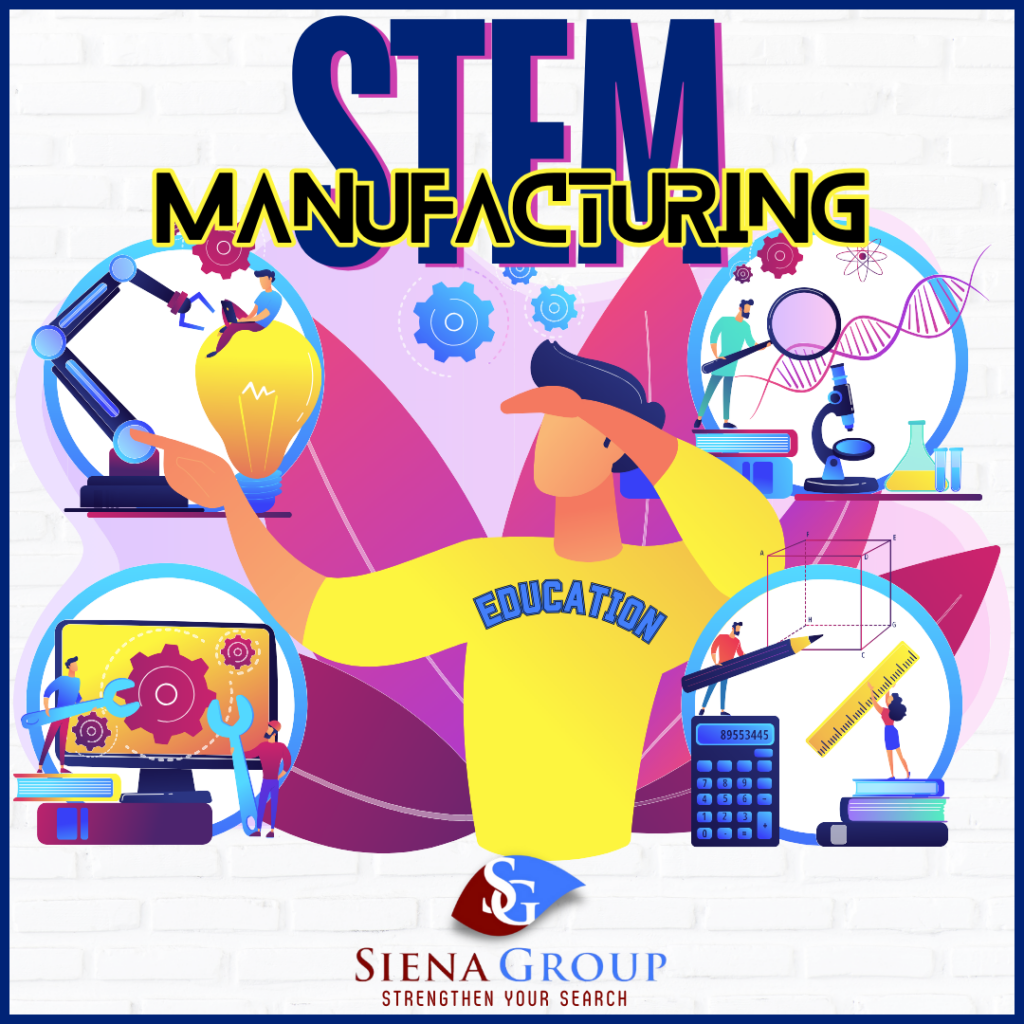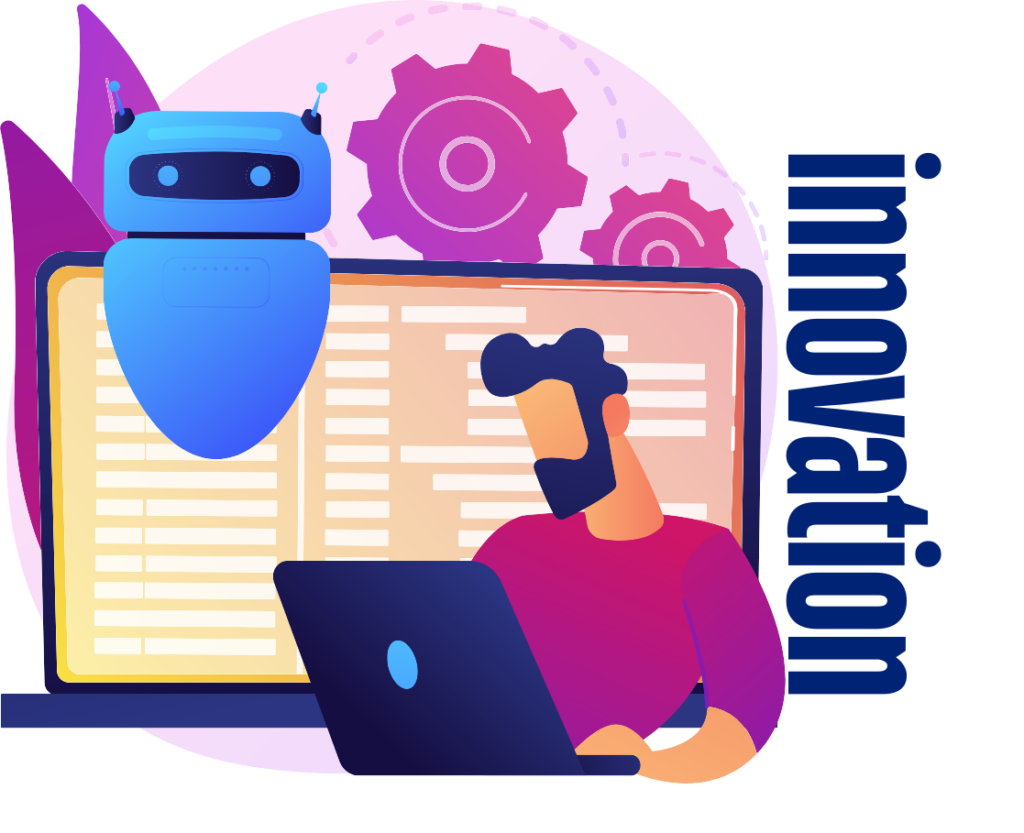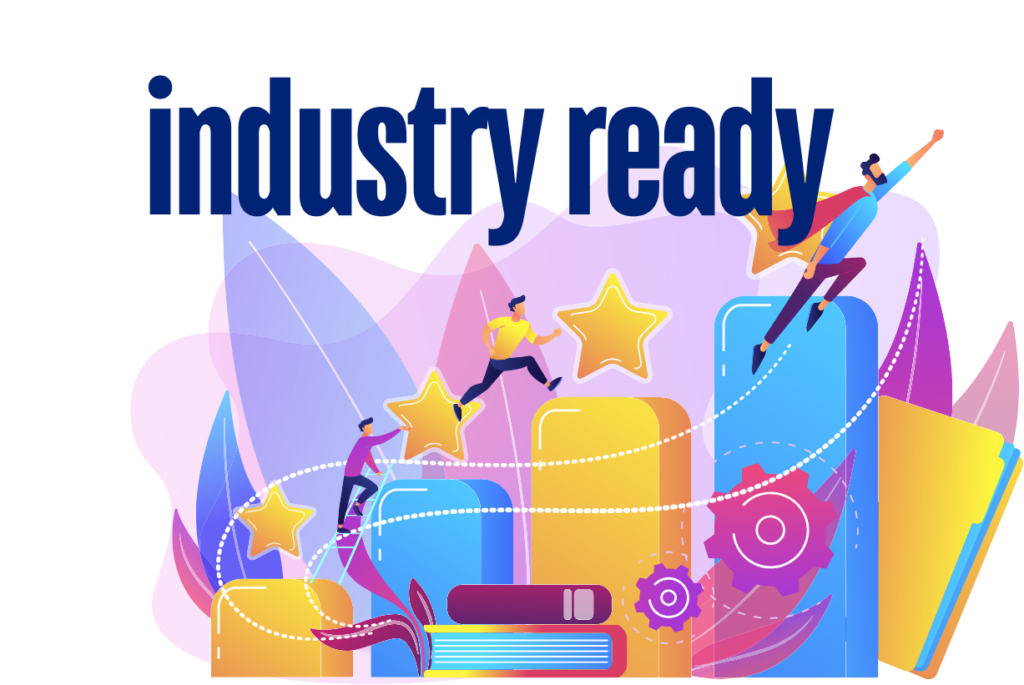The Role of a STEM Education in Manufacturing
by Keith Brown, President & Owner, Siena Group.

It’s long been known that a STEM education is valuable in the four fields that comprise the acronym — Science, Technology, Engineering, and Mathematics. But with technology playing an increasingly prominent role in nearly every industry, today’s STEM graduates are in demand everywhere.
These developments have particularly impacted manufacturing, as robotics, AI, machine learning, and other technologies changed, are changing, and will change production processes.
But how do we collectively tap into this valuable resource within the manufacturing world?
It’s a tough question to be sure! It’s the same question that is being asked about the shortage of skilled labor. “The Skilled Labor Shortage” is just one quick article that provides insights into the looming problems that we face in the manufacturing world.
To be clear, STEM education happens across a variety of institutions, from the obvious universities and colleges to technical colleges, and even from public and private charter middle and high schools. There is even a US News & World Report Ranking on STEM high schools!
The need for qualified STEM talent in manufacturing has never been greater, and I would argue this applies to both those who want to get a secondary education and those who don’t.
Here’s a look at the role that STEM has in manufacturing today with some helpful hiring tips for industry-ready talent!
A STEM Education Lays the Foundation for Innovation

So, how important is STEM in the world of manufacturing today? Many people would make the case that STEM lays the foundation for innovation in the industry today, thanks to intensive coursework and practical experiences. STEM students gain the theoretical foundation and practical skills to succeed in a highly competitive market.
A STEM education prepares workers for innovation in the manufacturing sector in a variety of ways: robotics, computer-aided design, and working with new materials. STEM prioritizes a creative approach to problem-solving and critical thinking — qualities that are critical for a competitive advantage in today’s manufacturing marketplace, be it for a Process Engineer… or a Process Technician.
With a mindset of experimentation and iteration, STEM prepares employees to adapt to technological changes and challenges the industry to redefine what is possible. These skills are inherent to some but are readily taught and learned as well.
A STEM Education Helps Bridge the Skills Gap

The skills gap between what employers need and what employees have — is among the major issues plaguing the manufacturing sector in the Industry 4.0 era. However, candidates with a STEM-like problem-solving approach have the talents to bridge the gap. Perhaps the most important way STEM impacts hiring in the manufacturing sector is by providing skilled candidates who can hit the ground running after recruitment.
That’s because STEM programs provide students with the practical skills and knowledge the manufacturing sector needs. Whether learning coding languages for automated systems or understanding advanced manufacturing techniques or precision machining, STEM equips a new generation with the skills needed to stay competitive in manufacturing today. Even at the high school level, teaching critical thinking and problem-solving lends itself extraordinarily well to the challenging environment that is the manufacturing floor.
A STEM Education Helps Create Industry-Ready Graduates

One of STEM education’s advantages is experiential learning and application. At the university and college level for those pursuing advanced degrees, from Bachelor’s degrees and beyond, internships, cooperatives, and industry partnerships expose students to manufacturing environments and allow students to transition from class to the workplace seamlessly. Restating the obvious, this also applies to hourly employees who want or need to get a great job directly after high school and there is a major need to beef up their interest in manufacturing. States are doing this explicitly for the trades (check out this article from NewsNation) and manufacturing companies need to jump on this bandwagon as well!
This kind of practical experience sharpens technical skills and develops soft skills like teamwork, communication, and adaptability – and interest. Manufacturing organizations participating in internship and industry partnership programs help prepare STEM graduates to join the workforce with the experience needed to be valuable assets from the start.
A STEM Education Influences Manufacturing Hiring Practices

Hiring managers and HR pros have seen firsthand how STEM has impacted the labor market. Candidates with STEM skills are in high demand for the efficiency and quality they can bring to manufacturing. It’s expected they will help develop cutting-edge new products and improve processes.
In addition to traditional manufacturing positions, STEM talent is needed in supply chain management, quality assurance, and sustainability. With manufacturing increasingly intertwined with other industries, interdisciplinary skills are almost a requirement, reinforcing the role of STEM education in preparing a mobile workforce.
The most significant impact of STEM might be how manufacturing organizations find and recruit candidates. While internships and community partnerships help develop emerging talent before they enter the workforce, they can’t fully satisfy the demand for STEM skills. Now, instead of looking to the elite schools for top STEM talent, manufacturers are recruiting from all universities and community colleges. And they are wisely starting to set up job fairs at 2-year technical schools and even high schools.
We found several helpful articles highlighting some of the efforts in this area:
- Manufacturing Institute’s Study: Manufacturing in U.S. Could Need Up to 3.8 Million Workers
- Why Should High School Students Consider Careers in Manufacturing
- How the Manufacturing Industry is Working to Interest High Schoolers
Manufacturers must also adapt to the preferences of younger generations to help attract more STEM talent. Millennials will comprise 75% of the workforce by 2025, and their desire to work at socially conscious companies is well-known.
More members of Generation Z will enter the workforce every year over the next decade. Gen Z values flexibility and work-life balance to the extent that more than 50% want hybrid schedules from their employer. The US Chamber of Commerce points to this as a reason for labor shortages, as younger workers seek different opportunities.
The nature of manufacturing work has made flexibility a challenge; as I’ve said before, “You kinda gotta be at the plant to make stuff!”
Still, manufacturing organizations must find a way to prioritize flexibility to attract the newest STEM talent. The overall opportunity that exists in manufacturing just isn’t broadly recognized and organizations like the Manufacturing Institute are tackling this issue and even providing resources.
Takeaway: A STEM Education Impacts Manufacturing Recruitment for Years to Come!

Just ask any niche recruiter or HR professional: technical talent is easily one of the toughest roles to find and hire!
Smart organizations are taking very good care of their engineers. Relocations are difficult (as they have always been) which exacerbates the problem. Because of the complexity and high technology that now exists in manufacturing, the overall need for the right skills has increased and will continue in the foreseeable future. It doesn’t take much to understand where the challenge is coming from!
Looking to the future, it seems STEM will only become more critical to the manufacturing sector and its hiring practices. STEM education prepares candidates for today’s technological world like few other educational tracks can.
It’s safe to say that, for the foreseeable future, a STEM education will remain the backbone for manufacturing industry advancements!
At Siena Group, we are your Thermoforming Talent Partner! We’re here to help in any and every way possible! With more than 30 years of experience in manufacturing, hiring & recruiting talent, we bring a greater understanding of the companies we partner with and the candidates we pursue. Let’s Strengthen Your Search!
Share our post with others
Love what you see? Share it with your connections now.
